Peter MALONE
Saturday, 18 September 2021 19:26
Care Bears Movie, The
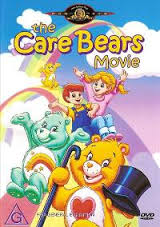
THE CARE BEARS MOVIE
US, 1985, 75 minutes, Colour.
Voices: Mickey Rooney, Jackie Boroughs, Harry Dean Stanton.
Directed by Arna Selzick.
The Care Bears Movie is a cartoon feature for the youngest audiences. 1t has cuddly heroes in the form of the Care Bears from the land of Care-A-Lot?. The animation is in the cute style - often (sometimes unjustly) called the Disney style. The film is sentimental and designed to appeal to the littlies.
Mickey Rooney is the voice for the character of Mr Cherrywood and the voice cast includes Harry Dean Stanton as the lion. There are two songs written and performed by Carol King, 'Care A Lot' and 'Home Is In Your Heart' and additional songs by John Sebastian.
The film is an edifying fable about love, care for the children.
1. An enjoyable film for the youngest audiences? The delight in the story, the animation? the fable and its message?
2. The quality of the animation? The colourful and cute style? The cuddly care bears themselves? The land of Care-A-Lot? The humans? The Great Fettuccini as villain? The songs and their introduction throughout the film?
3. The title and the focus on the Care Bears, the land of Care-A-Lot?, the message of love overcoming all evil?
4. The Cherrywood Orphanage: Mr. Cherrywood and the children going to bed, his performing some tricks, his being persuaded to tell a story? His voice-over storytelling? The revelation at the end that he is Nicholas? Cherrywood and his wife?
5. The orphanage, the underprivileged children, the story of Kim and Jason and their cutting themselves off from everyone, their not wanting to be hurt? Their missing their parents? The bear, Tender Heart, going to help Nicholas? Their being caught up in the story? Their going back to earth but with two bears being lost in the Forest of Feelings? The cousins of the bears helping them? The evil genie attacking them? Their being found by the Care Bears? The moral of the story to help them be with others?
6. The story of Nicholas, no friends, assisting the Great Fettuccini, Nicholas and the book of spells, his reading the spells, the evil spirit taking him over, tempting him, his chanting to be a great magician, the casting of spells of misery? The love and care being destroyed? The Care Bears finding Nicholas? Their love overcoming the evil spirit? Nicholas being transformed?
7. The Care Bears and their land in the clouds, a nice place, Tender Heart and the other bears, the mission to save Nicholas? Kim, and Jason lost with the two bears? The cousins? The happy harmony at the end when everything is all right?
8. The value of this kind of children's film? Optimistic fairy tale?
Published in Movie Reviews
Published in
Movie Reviews
Tagged under
Saturday, 18 September 2021 19:26
Cardinal, The
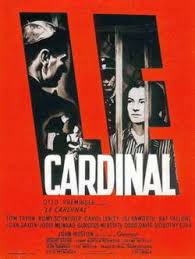
THE CARDINAL
US, 1963, 175 minutes, Colour.
Tom Tryon, Carol Lynley, Romy Schneider, John Saxon, Dorothy Gish, Maggie McNamara?, John Huston, Burgess Meredith, Jill Haworth, Raf Vallone, Robert Morse, Ossie Davis, Chill Will, Patrick O'Neal.
Directed by Otto Preminger.
The Cardinal is based on the very popular best seller of the 50s by Henry Morton Robinson. It was very popular amongst Catholics as well as Non-Catholics?. This version was made in the early 60s by Otto Preminger who enjoys a reputation of being daring eg. with The Moon is Blue and The Man with the Golden Arm in the 50s, Hurry Sundown in the 60s and Defiance of the Hayes' Office. Preminger moved into the spectacular field, especially with Exodus in 1960, and The Cardinal draws on his experience for these spectacles.
Tom Tryon takes on the central role quite effectively but was attacked by critics for being too stolid. (Tryon has since gone on to become a best-selling novelist.) Many stars, a number of whom appear in many of Preminger's films took guest roles in this particular film, the most notable was John Huston as Cardinal Glennon and Burgess Meredith as an ailing parish priest. The film presents a picture of Roman Catholicism prior to the Second Vatican Council, the issues in which it was involved in this century especially those of the developing American Church (and the reactions of the Ku Klux Klan) and the difficulties in Europe prior to World War II. The film reaches its climax in the period of the Anschluss.
When the film was made there was not such an exodus from the priestly ministry as there was in the late 60s and 70s. The film is interesting in retrospect in showing us priests with problems, taking time off, making a decision to continue. The Cardinal will appeal to all those who enjoy a large scale spectacular film. Preminger received a papal medal as an award during Vatican II and the film was screened to the Bishops present at the Council.
1. Why was this an enjoyable and appealing film? Its scope? Stars, religion, politics, human interest, intrigues and crises? why do audiences respond to these?
2. How successful was the film as drama? Entertainment in good taste?
3. How real was the film? In terms of people and incidents, real themes? Or did the whole film seem unreal and non-genuine? Was the feeling within the film real or contrived? Melodrama? What was the quality of the response of the audience?
4. What did the film presuppose in audiences as regards religion? The true nature of religion, piety, religious attitudes, the area of decisions and morals, the power of religion and the Church, the influence on politics, external and internal religion? The varying response depending on audience presuppositions about religion? Was the film a picture of genuine religion or not?
5. Comment on the structure of the film and its success: the flashbacks, the succession of incidents, the vastness of scope and its varying nature? Colour, widescreen, a religious spectacular? The varying locations?
6. How interesting a character was Stephen Fermoyle? We know that he is a cardinal at the beginning, how does this influence our attitudes towards the events in the film? The pomp and circumstance of the ceremonies? What kind of man was Stephen Fermoyle in his attitudes, behaviour, principles, emotions? As an American priest? As a churchman belonging to Rome as well as American? How convincing was Tom Tryon's performance? Was he a sympathetic character? Could audiences identify with him? Could they understand him? Did Father Fermoyle change and grow spiritually and as a man during all these events?
7. The importance of the American background for Stephen Fermoyle? The Catholic home, the family and their relationships, the influence of school and parish life? The inevitable vocation? Fermoyle's later comments on this?
8. The influence of Rome on Fermoyle; his studies as a priest, Cardinal Quarenghi and his friendship and support? Ordination in Rome, specialization in history? Inevitability of the clash with the Cardinal? The suspicion of Roman learning? His initial appointment? The emphasis on non-intellectual faith? Parish money etc. and organization? The Monsignor? What comment on church organization was being made in these sequences?
9. The importance of the incidents with Mona? Stephen's love for her? Her Benny, his instruction, his reaction to the hard line? Mona's confession and her disillusionment? Was her going away credible? The tango atmosphere and the way that this was communicated? Her relationship with the dancer? The drama and melodrama of the baby and its head being crushed? Did Stephen make the right decision as regards her death? The impact on his life of this decision? The reaction of the other members of the family, especially Florrie's hardness?
10. The importance of the sequence of his parish work in the outlying parts of the diocese? Father Haley and his lack of success, yet his humility? His illness? The support of ordinary people? Or did Stephen Fermoyle learn here? Selling his goods? Visiting the Cardinal and the Cardinal's visit to Father Haley? What influence did this have on his later life?
11. How important was Stephen Fermoyle's career? Did he seek a career in the church? Being chosen by the Cardinal, the conclave and the irony of his missing it, the work in Rome, Fermoyle's relationship with the other Cardinals, the nature of his work? How interesting were these aspects of his life?
12. Why did he ask for time off from the priesthood? How convincing were his discussions with Cardinal Glennon? Why did he go? The nature of his crisis? The inevitability of his priesthood, his guilt as regards Mona? The sequences of him teaching? were these credible? His chance to act as an ordinary man? The attraction for Anne-Marie? and her response? Ordinary life, yet tempered by prayer? How hard was his decision to come back? Was it well made? The visual impact of Anne-Marie? seeing the collar? Were the episodes about the African Americans of the Church well integrated into the film? Father Gillis' visit? A black pleading his cause in Rome? Rome's diplomacy? Fermoyle's decision to go to America? His interaction with the Monsignor who did not know his identity? The reaction with the Sheriff? The picture of Catholics picketing? The plight of the negroes? How well were the race questions presented? Were they explored? The dramatics and melodramatics of the Ku Klux Klan, the burning and the whipping? The impact of seeing a Bishop suffer this? His being let free by Lafe? And their discussion?
13. The importance of his work in Austria? Was this aspect of world history integrated well into the film? His consecration and status as Bishop? His being briefed in Rome about the Austrian situation? His diplomacy with Cardinal Innitzer? Cardinal Innitzer's attitude towards Hitler? The dramatic atmosphere in Austria? The encountering of Anne-Marie? Her unhappy marriage, the suicide of her husband? The importance of the Anschlus day and the siege of the Cathedral? The imprisonment of Anne-Marie?
14. What insight into a past era of the church? Insight into a man of the church? Valuable? Or merely entertaining?
Published in Movie Reviews
Published in
Movie Reviews
Tagged under
Saturday, 18 September 2021 19:26
Caravan to Vaccares
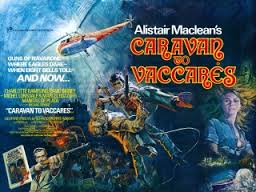
CARAVAN TO VACCARES
UK, 1974, 98 minutes, Colour,
Charlotte Rampling, David Birney, Michel Lonsdale, Marcel Bozzuffi, Manitas de Plata.
Directed by Geoffrey Reeve.
Alistair Mc Lean has been recurring regularly on our screens for several years. His plots - enterprising hero, derring-do in colourful situations, an inevitable surprise villain - are familiar despite the varied trappings; so one looks to the excitement of the adventures and the locations for enjoyment. Excitement is average here, although the helicopter-bullring finale is elaborate, the hero a sardonic forced-to-be hero. The treatment never lives up to its potential. Credit side includes Charlotte Rampling's vigorously attractive heroine, Michel Lonsdale's aristocratic Duke, gypsy carnival events in the wonderful marsh and horse territory of Provence. All in all, OK adventure entertainment and that's it.
1. Was this a good adventure film? Did it have credible adventure situations? Or did it have more the style of comic adventure series?
2. Comment on the style of the film: the ingredients and the execution, the Panavision and colour, the use of locations, the gypsy background, the situation in Provence? Helicopter flying, aerial photography etc. How enjoyable was this? was the full potential utilized?
3. Was the film a successful mystery? Were the clues well given? Was it unravelled clearly? Satisfyingly?
4. How sympathetic was Bowman? The American drifter in Europe, the easy life, the nonchalant hero? His moving away from things all the time, his attraction for glamour? The encounter with Lyla, the danger and the deaths, his toughness and his capacity for chasing? For fighting and his ingenuity for saving Zuger? The climax and crisis for him at the end? Was he presented well as a person or just as an adventure film hero?
5. How attractive was Lyla? An adventure film heroine or a person? Her strength and her independence? Her career, her glamour and her style, her role in the plot itself, the kidnapping, her ingenuity for getting rescued?
6. The character of the duke: how well was he explored? His French style, his deceit to Bowman, his master-minding and his failures? His emotional reaction to his daughter's death, his use of English language, his imperturbability?
7. How obvious was the villain? The smooth style etc.? His manifestation at the end and the bull-fight sequence?
8. Was the character of Zuger well explored? A mysterious character, his importance, his reckless behaviour, the credibility of his plan for solar energy? The deaths on his behalf.
9. What influence did the gypsies have in the film? Their initial appearance, the festival, as victims?
10. How obvious were the villains themselves - the psychotic murderer at first, the man with the stirrups and the horse, the pursuit, the guarding of Zuger and Lyla etc.?
11. How well done was the horse chase with the cross-cutting with the guitar playing? The car being chased by the helicopter? The helicopter fight? The bull-ring episode? were these highlights well filmed? What excitement did they generate? The importance of deaths in the film - audience response to the initial deaths, the gypsy, to the villains?
12. What emotional responses do films like this demand - the response to the glamorous comic world? How real or unreal does it seem? Was this a successful film?
Published in Movie Reviews
Published in
Movie Reviews
Tagged under
Saturday, 18 September 2021 19:26
Carapate, La
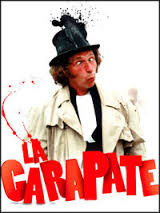
LA CARAPATE
France, 1978, 105 minutes, Colour.
Pierre Richard, Victor Lanoux, Yvonne Gaudeaux.
Directed by Gerard Oury.
La Carapate is a very entertaining and funny French drama. It stars comedian Pierre Richard and serious actor in a comedy role, Victor Lanoux. They form a very entertaining odd couple from their escape from prison, adventure through the French countryside and climax in Paris in the atmosphere of student revolution of 1968. The film compares well with Eduardo Molinaro's A Pain in the A... (L'Emmerdeur).
1. An engaging French comedy? The blend of comedy, farce, serious themes? The irony of the title and the focus on the odd couple being on the lam?
2. The background of 1968 and student revolution? The re-creation of the period? The implications for social disorder and rebellion in France? The scenes of revolution and the barricades? The repercussions for the prisons? The background of ordinary day-to-day life in France in this context? Sequences of Paris, Lyons? The prison, on the road from Lyons to Paris? ordinary people, students, the wealthy, the farmhouse people? Colour photography? The jaunty score?
3. The success of the comedy duo: Pierre Richard and his zany comic style in many films? The contrast with serious actor-turned-comedian Victor Lanoux? The contrast of their styles? Their reacting against each other? Zaniness and farce versus comic touches, versus pathos and the serious? The background of the legal profession, attitudes towards the political Left? The Right-wing prisoner? The odd couple on the road and the visual jokes, verbal jokes, comedy routines e.g. Richard imitating Harpo Marx?
4. Richard and his relationship with his father and the humour of carrying him and his travel? The martial arts? His going to the prison, fears, his trousers, the escape? The encounter with his client and the mistrust of each other? on the road and the growing bonds, the quality of friendship, his managing despite the difficulties, his father's presence, robbery, family, the petition, the search, the ending? The character in humorous circumstances? His changing with relationships?
5. Victor Lanoux as Martial? Tough, angry, the prison sequences, the escape, the suit too small for him and its bursting, the meticulous detail of the escape in the riot, his taking charge of the vehicle, his exasperation with his lawyer? Infatuation with women? The accident on the freeway? The White Swallow? Ingenuity, stunts? The car, the father, the barricades? His finally giving up and the spectacular escape through the window and into the Seine? Guilt and sympathies?
6. Audience response to the series of adventures: comic touches, their being worked into the plot, illustrating characters, the ingenuity of their staging? The suit and the escape, the car, the prostitute in the crash, the river, the helicopter, the truck and the leap. the robbing of the bank, the robbing of the car, the farm and the search, the truck and the accident, the police and the riot, the father and his house, Paris and the train?
7. The background of the barricades, student revolt, the rich couple and their car, the robbery and the explosion and destruction of the car and the money?
8. The father and his values, enjoying himself? The relationship with the family?
9. The farm sequence and the duplicity?
10. The couple and their escaping with their money and possessions, the picnic. their inability to go to the police, the robbing of the bank, the couple and the train? At the barricades and the explosion?
11. The sketch of the police and their pursuit of the odd couple?
12. The political and social background and the comment made for French audiences especially about French society in the '60s?
Published in Movie Reviews
Published in
Movie Reviews
Tagged under
Saturday, 18 September 2021 19:26
Car, The
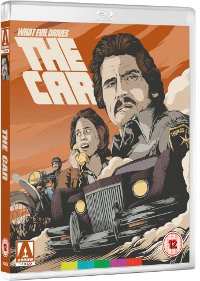
THE CAR
US, 1977, 98 Minutes, Colour.
James Brolin, Kathleen Lloyd, John Marley, R.G. Armstrong, John Rubinstein.
Directed by Elliot Silverstein.
The Car shows the devil incarnate and quite a hell-driver. Not a bad modern horror idea (shades of Duel), the modern power machine as menacing and destructive evil. This thriller plays it straight and unsubtly (amid beautiful location photography and pounding chords) looking kin to a western with Sheriff James Brolin confronting the outlaw car which stalks, lurks, racial confrontations, charges and revs as if it were pawing the ground before attacking. The car certainly communicates a vindictive anonymous personality. The humans are conventional - cute or violent and few of them seem to deserve such malevolent deaths. No masterpiece, but a quite entertaining horror thriller.
1. Audience expectations of films about cars and car chases, menace and destruction? The tone of the publicity, the reference to the occult?
2. How good was the blend of cars, machines, chases, the occult? The atmosphere of menace, the ordinary start and the menace of the car and its destruction, a killer car? How did this set the tone for the rest of the film?
3. The basic idea of the car as the devil incarnate? A plausible idea, imaginative for occult science fiction? The devil in the kinds of menace of evil from outside the world, the attacking of human beings, destructive? The malevolence of evil and the devil?
4. The importance for audience response to malevolent and malignant evil? The fact that it had no rational explanation? The car with its knowledge of where people were, what they were doing, its manoeuvres, sizing people up, cruelty, sadism? The car as a symbol for modern evil? The visual accompaniments of the car, eg the wind, the dust, the sense of presence of evil? How effective a symbol?
5. The victims of the car and whether they deserved such malevolent deaths: the boy and girl at the beginning, their joy and seeming innocence, bike riding amid such beautiful scenery, holiday atmosphere and the evil yellow screened menace of the car? The violence of their deaths disrupting the holiday atmosphere? The transition to John Norris and his playing his instrument, his encounter with Amos, the threat of the car and the innocent lift-seeking and the car's returning, hiding in the dust, killing him and running over him continuously? The killing of Everett in the middle of the street, the manoeuvres and the tricks to kill the pursuing police, the menacing of the children and the teachers at the parade ground and in the cemetery, Lauren and her challenging of the car and its crashing through her how? The arbitrary selection of victims? The reasons for the victims, eg. Everett, the police, and revenge on Lauren?
6. The importance of the location photography and its beauty, the desert and the mountains, the ordinary American town, the beauty of the world? Dust and wind and evil within this beautiful location? The use of the terrain for the destruction of the car?
7. How important was the presentation of an ordinary American town with ordinary people; cute people, attractive people, violent people? The mixture of good and bad? Wade as embodying the town because of his administration of justice and the law? His wife, children, relationship with Lauren? The length given to his waking up, Lauren and her place in the house, the girls listening? His taking the children to school - an ordinary day for evil to arrive? The contrast with Amos and Bertha and the boy and the atmosphere of violence and oppression? Margie and her love for Luke and his giving up drink, his fears? Everett and his role in the town, his knowledge of Bertha and trying to help her? An atmosphere of cruelty, happiness? school, the atmosphere of growing up, the march and the rehearsal, the bands, drawings (and the precociousness of the boy drawing his teacher?), the Indians and their place in the town? A cross-section of America and the car as evil menacing ordinary America?
8. How well did the film structure create atmosphere with the stalking of the bike riders and the violence of their deaths, showing them fall from great heights etc.? The transition to the John Norris story and the hiding in the dust, the car acting like a menacing and mad animal? Amos, who was also violent, reacting against this?
9. How well did the film develop the anonymous personality of the car - showing it as elusive, the atmosphere of wind, the way that it arrived at the parade ground, chased the children, confronted the people in the cemetery, bashed the gates, ran along the highway, outwitted the police, pushed them over cliffs, made them crash into each other, leapt over other cars, came towards the house in the distance and crashed through it, stalked in the garage and menaced as Wade tried to escape, led the pursuit, overtook people, was made victim of human ingenuity for the explosion?
10. Was Wade an adequate adversary for the car, as a person, man, his role as sheriff? Seeing him at work, in the chase, on the bike? The challenge to the car and the car's confronting him, bashing him with the door? The experience of hospital, the grief at Lauren's death? The importance of the plan and his tempting the car on the cliff? Did he really admit that the danger was over at the end?
11. How attractive a character was Lauren, her initial vitality, at the school, with the children, her confrontation of the car and everybody's admiration, her devotion to Wade and the visit to the hospital? The importance of her being alone in the house, on the phone with the car lights seen through the distance and the abrupt smashing through the house and her death?
12. Luke as a character, assistant policeman, drinking problem, bonds with Margie? Margie and her bravery at the cemetery? Her helping the children? Luke and his fears and knowledge that all was not over?
13. The background of the Indians, the assistant policeman, the old lady and her information about the car having no driver? An eerie atmosphere?
14. Everett and his place in the town, the suddenness of his death, the car's malice?
15. Amos and Bertha and their fights, the fight in the street and Amos seeing Everett's death? The bully in jail? Used at the end to Bully the car?
16. The details of the plan, the pace of the film, the constant motion of the car, the need for both vehicles to get to the top of the cliff, Wade climbing the cliff and stalling the car?
17. The impression of the explosion, the special effects, the artificial fire, hellish fire?
18. The final view of the men standing in line against the cliff and the hope that all was over, the irony of the car continuing in the city daring the final credits?
19. The atmosphere of good and evil, the symbolic exploration of malevolent evil stalking human beings in modern settings?
Published in Movie Reviews
Published in
Movie Reviews
Tagged under
Saturday, 18 September 2021 19:26
Captain's Paradise, The

THE CAPTAIN'S PARADISE
UK, 1953, 83 minutes, Black and White.
Alec Guinness, Yvonne de Carlo, Celia Johnson, Miles Malleson.
Directed by Anthony Kimmins.
The Captain's Paradise is one of those short, but excellent, British comedies of the early 50's in which Alec Guinness delighted world audiences and gained an outstanding reputation as a comedian.
Here the comedy treats pleasantly the theme of man's search for perfect happiness and the two sides of his nature, conventional and unconventional. The story of a captain plying between British Gibraltar and exotic Algiers with a typical wife in each port is a good setting. However, the wives are shown as reflecting the two aspects and there is clever cross-cutting as Maud becomes more lively and Nina tries to be more domesticated. Celia Johnson and Yvonne de Carlo enjoy their portrayals of the typical but changing wives.
A sophisticated and witty little pointed comedy.
1. Was this a good humorous comedy? Did it provide many laughs? How?
2. How effective was the rather precise structure of the film - the flashbacks and return to the narrative of Rico and the Captain's uncle, the paralleling and contrasting of Gibraltar life with Algerian life, the contrasts with the wives and the final revelation that the Captain did not die?
3. Although the treatment was light, there was a satirical message in it and a lot of observation of human behaviour and human yearnings for happiness. What was the theme of the film?
4. What was Captain St James seeking? How close did he come to happiness?
5. How did Alec Guinness make his character interesting and entertaining? what devices were used to contrast his attitudes and behaviour in his two different worlds - his clothes for shore, his going home, arriving (and whistle), eating habits, dancing etc?
6. The wives contrasted obviously, each representing the typical Englishwoman or Algerian woman. How did they gradually change and why did the Captain not realise this? (How did this show that he was really selfish?)
7. How was Maud's visit to Algeria an important development in the film? What was the effect of the situation comedy, the meeting of the two wives?
8. How did each wife get exasperated over the years? Why?
9. Comment on Nina's meal sequence and Maud's night out.
10. Why did each wife want to leave the Captain? Were they right?
11. What do you think happened to the Captain eventually?
12. What did the film have to say about human nature and human limitations?
Published in Movie Reviews
Published in
Movie Reviews
Tagged under
Saturday, 18 September 2021 19:26
Captains Courageous
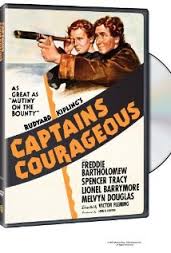
CAPTAINS COURAGEOUS
US, 1937, 116 minutes, Black and White.
Spencer Tracy, Freddie Bartholomew, Mickey Rooney, Lionel Barrymore, Melvyn Douglas.
Directed by Victor Flemyng.
Captains Courageous is a boys' story and the film appeals even after many decades. The story of a spoilt boy learning to survive and growing into a likeable boy is always cheering. Freddie Bartholomew, popular as a child-actor in the 30's, is effective in the role. Spencer Tracy, who won an Oscar for this performance, is the kindly sailor, Manuel, who befriends and educates the boy. There is plenty of action and sea adventure. A similar film, also to be recommended is Down to the Sea in Ships (1948).
1. A good adventure story? Why? Strong in human interest and enjoyment? Why?
2. How closely were audiences meant to identify with Harvey? Was this important for an understanding of the theme of the film? (Did this mean that the film was mainly one for boys?).
3. How strongly did the film make Harvey the central character? At home? Arrogance and the servants' reactions? His friends' reactions towards their enjoyable stay? Bribing his friends? Conduct at school? situation of the printing press? His meanness and calculation? Modelling himself on his father? Reactions to the teachers and his going into Coventry?
4. As a parallel to this, how well did the film visualise Mr. Cheyne? Especially in his haste, meals, timetable, preoccupation with his work, telephone communication with his son? What comment about the father son relationship was made by these visual means?
5. Did you think that the school authorities handled Harvey's situation well? Within the framework of school discipline, and for the discipline of the other boys? The fact that they were subjected to Mr. Cheyne's investigations? That they had to be beholden to benefactors? Did they explain the situation well? How should Mr. Cheyne have handled Harvey?
6. Why didn't Harvey learn by his being sent away from school and his 'rusticating'? Did he realise what he needed? (Was this possible for a boy of ten?) .
7. How important were the sequences on the ship? The fact that he had not learnt anything from his experience? His arrogance with his father, the ship's crew, the boys and their drinking of the sodas?
8. How did the film change atmosphere when he fell overboard? From a big ship to a small ship via the sea? How important was this change of atmosphere? To show Harvey in an alien and different atmosphere? That he would be lost?
9. How reassuring was the new atmosphere for the audience? Small simple fishing ship? Ordinary work? Atmosphere of friendliness?
10. How did Harvey's arrogance stand out in such a new atmosphere? Was he credible at all? The lack of understanding from the ship's captain and crew?
11. How good a character was Manuel? Why did audiences like him? His simplicity? (His accent and his Portuguese background, his singing etc.?). The fact that he was the opposite of Harvey, his saving of life and enthusiasm for his work, the significance of his speeches about his father and going to heaven, his conception of heaven as a fishing place. his relating of Christ and the Apostles as fishermen etc.? How did Manuel stand out alongside the rest of the crew? In his relating to Harvey?
12. The captain? Was his treatment of Harvey just? His not wanting to believe Harvey's story? His decision to keep him and employ him? Concern for the men? Good humour? Rivalry with the other captain?
13. Dan as a hardworking young lad? As a contrast with Harvey? How importantly. especially at the end?
14. Why was Jack continually complaining? The dispute about Harvey as a Jonah at the meal table? Blonde Jack and his continual rivalry with Manuel? Harvey tampering with his line? Harvey owning up to Blonde Jack? How did this change Jack's attitude?
15. How well did Harvey learn during his time on the ship? His initial wanting to cheat. his facing up to the truth? And his emotional needs being filled by his friendship and admiration for Manuel?
16. How vividly did the film present the fishing life? In its details. in the atmosphere of the sea? The way the ship and the sea were filmed? How important was the race?
17. Were you surprised that Manuel died? Was it the captain's fault with his foolish rivalry? Merely an accident? The nobility of Manuel's death? Did you identify with Harvey's grief?
18. How did the return to land prove a crisis for Harvey? The fact that he had loved someone and had learnt something worthwhile? The cold relationship with his father? His going to the church and to Manuel's boat?
19. How did time heal Harvey's wounds? The importance of the sequence of the throwing of the wreaths into the water? The possibility of Harvey and his father relating? The final sequence of Harvey telling tall stories in the car?
Published in Movie Reviews
Published in
Movie Reviews
Tagged under
Saturday, 18 September 2021 19:26
Captain Newman M.D.
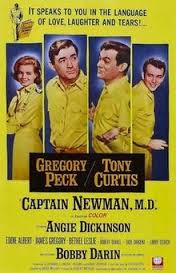
CAPTAIN NEWMAN M.D.
US, 1955, 125 minutes, Colour.
Gregory Peck, Tony Curtis, Angie Dickenson, Eddie Albert, James Gregory, Bobby Darin, Robert Duvall.
Directed by David Miller.
Captain Newman, M.D., is interesting comedy-drama, trying to communicate to a general audience something of the need for an understanding of a human psychology, that mental illness is real illness and not sham or cowardice. The scene is World War II which puts the action in a past that is still within memory and safe for showing men with nervous breakdowns. An audience can be 'on side' in looking at the men suffering in World War II, and can then make the necessary transition from the 1940's to the present day.
Gregory Peck suits the part of upright, faith-in-his-mission Captain Newman. He is assisted by Tony Curtis in an entertaining American style comedy performance. In fact the whole film is a popular mixture of serious problem drama, romance, sentiment and comedy. Bobby Darin and Eddie Albert (for young and for old) act well as neurotic patients.
1. Comedy or a drama?
2. What was the theme of the film?
3. The film dealt with a difficult question of mental health further complicated by the war situation. What message was it trying to get across to the general public? Considering it as a popular film, with box-office stars. do you think it had an appeal and communicated its message?
4. Why was the commanding officer out of sympathy with Captain Newman's ideas and methods? Considering the war and expecting people to be afraid, do you think he had many grounds for his attitudes?
5. What effect did Captain Newman's first rounds of the wards make on you? Did it convince you that he was right?
6. What was the nature of these men's illnesses? Why did they crack up? How could they be cured?
7. Was Tony Curtis' role merely for comic effect, or did the orderly really help the men in their illness?
8. The episode of the insane major - 'Mr. Future'. Does this kind of thing happen to people? Could he have controlled himself, admitting his situation? What responsibilities had been too much for him? Why did he kill himself? Was he in full possession of his faculties when he killed himself?
9. Little Jim - why did he crack up? What facades did he put up? How was he cured?
10. Paul - why did he crack up? Why his silence? Why did he react to his wife's visit as he did? What part did family reputation and honour have in his illness?
11. Did this film help you to understand human nature a little better?
Published in Movie Reviews
Published in
Movie Reviews
Tagged under
Saturday, 18 September 2021 19:26
Captain Lightfoot
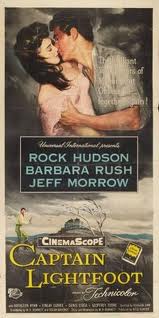
CAPTAIN LIGHTFOOT
US, 1955, 92 Minutes, Colour.
Rock Hudson, Barbara Rush, Jeff Morrow, Kathleen Ryan, Finlay Currie.
Directed by Douglas Sirk.
Captain Lightfoot is Saturday matinee type entertainment portraying the Irish troubles around 1815. It was a star vehicle for Rock Hudson as his career was on the rise. The film was directed by Douglas Sirk, notable for his stylish soap operas. He directed Hudson in more than half-a-dozen films including Magnificent Obsession, All That Heaven Allows, Written on the Wind. The film was attractively photographed in Ireland. While it gives no great insight into the troubles, it does provide a feel for Irish rebellion and antagonism towards the British.
1. An entertaining adventure? Period costume melodrama?
2. The impact of the Irish troubles - the past, the response from an audience aware of the troubles in the present? A feel for Irish history, British and Irish conflict? How much understanding did the film offer?
3. The value of the Irish location photography, colour, wide screen? Period decor and costume? The score and the Irish melodies?
4. The film as an action adventure - highwaymen, fights, the siege of the castle?
5. The film as a Rock Hudson vehicle? As Captain Lightfoot, an Irish hero, the type of heroism of the ordinary man from the village rising to authority within the society and amongst the rebels? How convincing was Rock Hudson as an Irish hero?
6. The impact of the Irish fighting against the British and the landlords - the highway robberies, the money collectors, the British nobility, the gamblers, the authorities in Dublin Castle, the police?
7. The presentation of the society - its credibility: their villagers, their meetings, their plans, the collecting of money? The aims of rebellion? Michael and Tim in this society, Michael and his outspokenness? Regis and his low profile? Aga and her return to the society, getting their help, their misjudging of Regis, the fight and the siege of the castle? The society expressing Irish hatred for the English?
8. The portrait of Captain Thunderbolt - first meeting him as the clergyman, his reliance on Michael, the meeting of Callaghan in the inn, the test of strength with the fight and Michael's naivety? The gambling house as a cover, the getting of money from the nobility for the society's cause? The clashes, especially with Hood? Aga and her causing his imprisonment? His relationship with Lady Anne, with Aga? His escape, the siege of the castle and his saving Michael? The type of the Irish revolutionary?
9. Michael growing in skill under the guidance of Captain Thunderbolt, of Lady Anne? His love for Aga? His work in the gambling house, the clash with Captain Hood and his jealousy of Aga, his duel and his letting Hood go?
10. Hood, his gambling connections, the British and their attitudes towards the Irish?
11. Michael’s device to free Captain Thunderbolt, his capture, torture, being taken to the village, his imprisonment?
12. The presence in the castle, his suspicions of Regis, the escape and the heroism?
13. The character of Regis - the audience suspecting him of complicity? His heroism at the end?
14. The appropriateness of the happy ending for this kind of costume romance? At what entertainment level did the plot work? With what success?
Published in Movie Reviews
Published in
Movie Reviews
Tagged under
Saturday, 18 September 2021 19:26
Captain Horatio Hornblower, R.N.
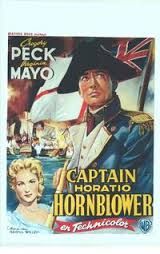
CAPTAIN HORATIO HORNBLOWER, R.N.
UK, 1951, 116 Minutes, Colour.
Gregory Peck, Virginia Mayo, Robert Beatty, Terence Morgan, James Robertson Justice, Stanley Baker, Christopher Lee, Denis O'Dea.
Directed by Raoul Walsh.
Captain Horatio Hornblower is a colourful film version of a Napoleonic novel by C.S. Forrester. Forrester was a popular action novelist of the 40s and 50s - eg. The Pride and the Passion was the film version of his novel, The Gun. Gregory Peck in the title role is not as adventurous and swashbuckling as Errol Flynn might have been a decade before. Virginia Mayo is very decorative as the heroine but not the actress that Olivia de Havilland was. Direction is by Raoul Walsh who made so many of the action adventures at Warner Bros. in the 30s and 40s. However, there is a lot of entertainment in the swashbuckling tradition in this film. (Sections of its action footage were incorporated into the 70s drama about Nelson, Bequest to the Nation, with Peter Finch and Glenda Jackson.)
1. Was this an enjoyable adventure film? Why do such films appeal? In what lies their chief appeal?
2. This was a film of the 50s. What characteristics of 50s film-making did it have? Is it still an appealing adventure for modern audiences?
3. How well did the film use colour, spectacle, ships, the sea? The musical and stirring background?
4. Why are films which show details of naval life in the 18th century of interest? The discipline, the danger, the routine of life? which sequences best illustrated this? The British overtones of the film and the sense of patriotism and glory for England? The Napoleonic Wars? The maps, the adventurousness of English sailing into unknown oceans? The background of the wars? The alliances with Spain, Central America? The belief in English glory? Allies and achievement? Heroics? The appeal for audiences? Hornblower as the central character and hero, how convincing and appealing? Gregory Peck's style? The nature of Hornblower's heroism, his leading his men, eliciting loyalty, administering justice, and yet his guesses about his destiny? The importance of his decisions in alliances and taking the ship? His treatment of El Supremo? His alliance with the Spaniards? The defeat of E1 Supremo? The hazardous nature of the voyage and bringing the ship home? The treatment of Lady Barbara? His admiration by the admiralty? His role against the French? His decision to destroy the fleet? The heroics of his escape? Was he a real character or was he a fiction hero? The personal side of Hornblower? How convincing? His friendship for the men, his stern behaviour? His interest in the seamen, promoting the young seaman? The involvement with Lady Barbara? The reality of his wife and child? How artificial was it to find that his wife had died? That Lady Barbara had married? That her husband had died? The happy-ever-after kind of ending?
8. Comment on the personalities of the crew and the impact that they made? In terms of discipline, loyalty, the bets, the fighting, the deaths?
9. Lady Barbara a convincing heroine? Her relationship to the Duke of Wellington, her role in the ship, her work as a nurse, her romantic involvement. the irony of the marriage, her presence at the end?
10. The irony of Lady Barbara's fiancee and his work at the Admiralty? His hostility towards Hornblower? Hornblower's self-vindication?
11. What were the dramatic highlights of the film? The highlights of the battles?
12. How good a picture of a different age was this? Differences in attitude, in loyalty and patriotism? Did it seem real? Or is it the romantic memory of history?
Published in Movie Reviews
Published in
Movie Reviews
Tagged under